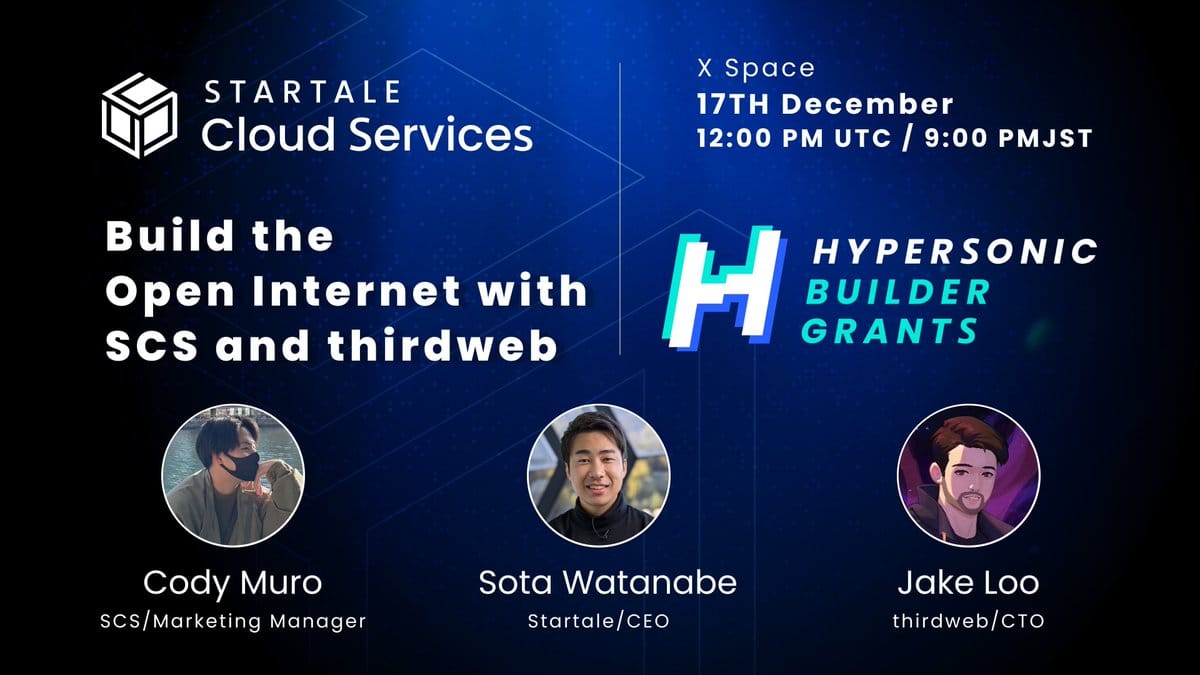Build the Open Internet with SCS and thirdweb

Startale Cloud Services (SCS) hosted a Twitter Space discussion yesterday, focused on the key technologies driving mass adoption in Web3, particularly account abstraction, zero-knowledge proofs (ZKPs), and AI agents.
Cody (Moderator) initiates the discussion by introducing Sota Watanabe, CEO of Startale Group, and Jake Loo, CTO and co-founder of thirdweb. Startale Group is behind the development of Astar, Soneium, Startale Cloud Services, and Sony Blockchain Labs (a joint venture with Sony Group). thirdweb provides a full-stack Web3 development toolkit, empowering developers to build decentralized applications.
Sota explains Startale's strategy of entering the Polkadot ecosystem first with Astar Network in 2019 due to its growth potential, despite the strong competition from Ethereum. Subsequently, they partnered with Sony Group to develop Soneium on Ethereum, leveraging their expertise in infrastructure development. He highlights their focus on vertically integrated products, aiming to improve user experience and cater to ordinary users rather than just Web3 enthusiasts. Sota emphasizes the importance of usability and demonstrating how Web3 empowers users, rather than focusing on token price fluctuations. He then introduces Startale Cloud, a product encompassing RPC, blockchain APIs, indexers, and future account abstraction capabilities. He sees this product, along with partnerships, as enabling them to develop application-layer tools in the future. He finishes with the point that Startale's vertical integration aims to offer value not only to Web3 experts but also to everyday users. He envisions a future where users interact with Web3 applications seamlessly without even realizing the underlying blockchain technology.
Jake provides an overview of thirdweb, a full-stack Web3 development platform that simplifies the process of building decentralized applications. He describes thirdweb's three core product categories:
- Connect: Facilitates user onboarding with features like crypto payments, smart account integration, in-app wallets, and social logins.
- Engine: Focuses on backend scalability, enabling efficient transaction management, automatic retries, and handling gas complexities.
- On-Chain: Provides modular smart accounts and pre-built, audited smart contracts, enabling developers to quickly build applications without writing their own contracts.
He also mentions Insight, a data indexer for efficient blockchain querying, and Nebula, their new AI product.
Cody shifts the discussion to SCS, asking Jake for a brief explanation. Jake reiterates thirdweb's focus on providing a full suite of tools to streamline Web3 development, allowing developers to concentrate on business logic rather than blockchain intricacies.
The conversation then moves to the recent announcement of two SCS initiatives: the Hypersonic Builders Alliance and the Hypersonic Builder Grants. The alliance aims to unite top-tier infrastructure and development tool providers on Soneium, empowering Soneium builders. The grants program, launched in collaboration with thirdweb, offers $200,000 in funding for projects building on Soneium and utilizing SCS and thirdweb services. The grant specifics require building on Soneium Minato, using SCS RPC services, and incorporating at least one thirdweb tool. Cody emphasizes the long preparation behind the launch of SCS and the significance of these initiatives. He also points out that more tools are planned for SCS beyond their current RPC node offerings, such as APIs and account abstraction.
Cody then directs the conversation to the key technologies driving mass adoption in Web3.
Sota identifies account abstraction and privacy solutions like ZKPs as crucial. Account abstraction simplifies blockchain interaction for general users by removing the need to understand or directly interact with blockchain concepts. He expands on how account abstraction features like Bundlr and Paymaster can improve user experience, enabling transactions in familiar currencies like USDC or fiat-backed stablecoins, and subsidizing gas fees through subscription models similar to Netflix or Amazon Prime. He next addresses the growing need for privacy as on-chain economic activity increases, advocating for ZKP implementation to protect sensitive information and incentivize broader participation.
Jake agrees with Sota's points on account abstraction, highlighting thirdweb's full-stack approach. They provide not only modular contracts and SDKs for easy integration into apps and games, but also bundled infrastructure like Bundlr and Paymaster. He emphasizes that account abstraction simplifies development and improves user experience by handling payments, gas complexities, and transaction management. Beyond the practical benefits, Jake sees account abstraction as unlocking the programmatic potential of modular accounts, especially with standards like ERC-4337. He mentions the innovative use of session keys for granular transaction authorization, opening possibilities for cross-chain interactions and enhanced security. He concludes that account abstraction, particularly the programmability of modular accounts, will lead to creative on-chain use cases.
Cody brings up the topic of ZKPs, asking Jake for his perspective. Jake acknowledges the growing maturity of ZK technology and the potential of ZKVMs, but cautions that it's still early stages. He sees the cost and complexity of ZK proofs as current limitations and anticipates further development before widespread adoption in application development.
Sota concurs with Jake's assessment of ZKPs, noting the high cost and scalability limitations. While not actively working on ZKPs, he recognizes the immense potential for future applications.
Cody then steers the conversation towards AI, noting its prominence in the Web3 space.
Jake introduces the concept of AI agents, programs capable of understanding instructions, using tools, and performing actions autonomously. He explains that while current AI agents primarily focus on trading, they haven't significantly impacted end consumers. He unveils thirdweb's Nebula project, which focuses on building AI agents specifically for Web3. Nebula involves training a blockchain-specific language model and creating a chat interface for interaction. This interface allows users to perform on-chain actions, such as sending tokens, through natural language instructions. Jake points out that current large language models struggle with blockchain concepts. Nebula aims to address this by training a model that understands Web3 primitives and can interact directly with the blockchain, generating and executing transactions based on user instructions. He further explains that Nebula offers additional endpoints for direct transaction generation and code generation, streamlining smart contract development. He believes AI agents will revolutionize blockchain interaction, particularly in areas like cross-chain transactions and complex operations, opening up a new era of user-friendly Web3 applications.
Sota shares his research on AI agents, particularly their potential with smart contracts. He views smart contracts as automating transactions, while AI combined with smart contracts can automate economic activity itself. He also points out the potential societal impact of AI, specifically job displacement, and the need for methods to distinguish AI-generated content from human-created content. He proposes using blockchain, specifically decentralized IDs and proof-of-humanity concepts, for this purpose. He acknowledges Worldcoin's efforts in this area but suggests further exploration of methods is needed. He envisions a future where AI agents operate hierarchically, with AI managing other AI, creating complex autonomous systems. He contemplates the potential of AI-created wealth in the form of cryptocurrency, raising ethical considerations about ownership and control. He concludes that to preserve humanity in this evolving landscape, KYC is essential to link AI agents to entities or individuals, preserving existing societal structures and systems.
Cody expresses his excitement about the potential of AI agents and the importance of account abstraction, highlighting the synergy between these technologies. He acknowledges the significance of these advancements in simplifying the Web3 user experience and reducing the complexity associated with wallet addresses and private keys.
Sota expresses his enthusiasm for AI agents, sharing his upcoming participation in a government-organized camp in Kyoto to propose AI and blockchain strategies. He emphasizes his research on empowering AI agents through smart contracts, viewing this as a key area for automating economic activity and potentially creating new forms of AI-generated wealth. He raises concerns about job displacement and the need for proof of humanity to distinguish AI-generated content. He highlights KYC's role in linking AI agents to individuals or entities to preserve existing social structures.
Cody concludes the discussion by reiterating the Hypersonic Builder Grants program, encouraging developers to explore the opportunities it presents for Soneium development. He emphasizes the eligibility criteria and the availability of support from SCS and thirdweb. He also mentions the Demo Day event in January for grant winners to showcase their projects.
Jake provides closing remarks, highlighting thirdweb's recent launch of Insight, their blockchain data indexing tool, and reiterating the importance of AI agents and their Nebula project. He encourages developers to sign up for the Nebula waitlist. He also teases an upcoming integration of AI agents with smart wallets, promising innovative possibilities in the future.
In summary, the discussion emphasized the importance of user experience and accessibility as key drivers of Web3 adoption. Account abstraction, ZKPs, and AI agents were highlighted as transformative technologies with the potential to simplify blockchain interactions, enhance privacy, and unlock new possibilities for decentralized applications. The Hypersonic Builders Alliance and Grants program, along with projects like Nebula and Startale Cloud Services, exemplify the collaborative efforts within the Soneium ecosystem to drive innovation and accelerate the growth of Web3. The conversation also touched on the potential societal impacts of AI, including job displacement and the ethical implications of AI-generated wealth, prompting reflection on the responsible development and implementation of these powerful technologies.
Please follow us to read more about Finance & FinTech in Japan, like hundreds of readers do every day. We invite you to also register for our short weekly digest, the “Japan FinTech Observer”, on LinkedIn, or directly here on the platform.
We also provide a daily short-form Japan FinTech Observer news podcast, available via its Podcast Page. Our global Finance & FinTech Podcast, “eXponential Finance” is available through its own LinkedIn newsletter, or via its Podcast Page.
Should you live in Tokyo, or just pass through, please also join our meetup. In any case, our YouTube channel and LinkedIn page are there for you as well.




